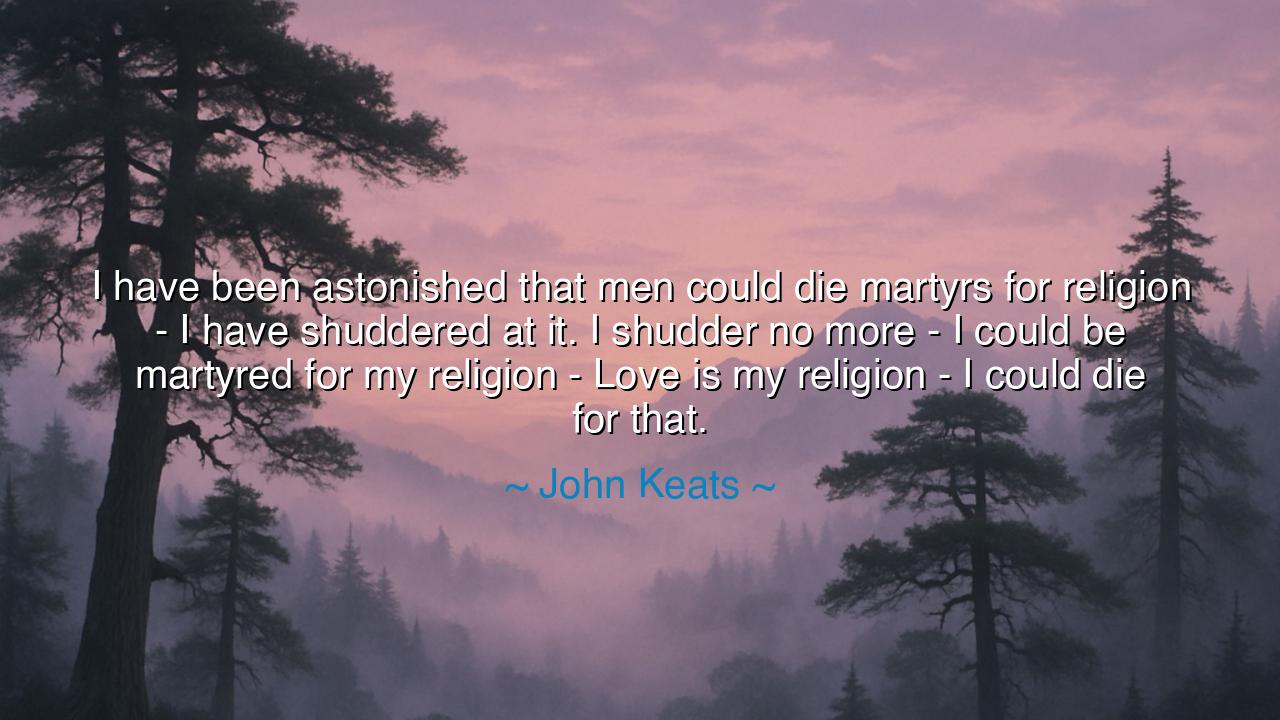
I have been astonished that men could die martyrs for religion -
I have been astonished that men could die martyrs for religion - I have shuddered at it. I shudder no more - I could be martyred for my religion - Love is my religion - I could die for that.






In the sacred journey of life, where human beings have long sought meaning, purpose, and transcendence, John Keats’s words echo with a profound transformation of the soul: "I have been astonished that men could die martyrs for religion - I have shuddered at it. I shudder no more - I could be martyred for my religion - Love is my religion - I could die for that." Keats, in this evocative declaration, speaks of a shift—from the horror of martyrdom in the name of religion, to a profound acceptance of sacrifice for a cause that is deeply personal and human. His words draw us into a meditation on the nature of love, faith, and sacrifice, and what it truly means to live and die for something greater than ourselves.
In the ancient world, the idea of martyrdom for religious causes was a concept deeply embedded in both the Greek and Roman traditions. The great philosophers of antiquity, like Socrates and Plato, often explored the relationship between life, death, and the pursuit of truth. Socrates, in his final moments, embraced death rather than renounce his philosophy. Yet, his death was not one of blind religion, but a testament to the truth he sought, a belief in something greater than the physical world. Plato, too, taught that true virtue could transcend death, leading the soul toward immortality. However, neither embraced martyrdom in the name of religion, but rather for the pursuit of wisdom and truth—a purpose that, for them, was a higher form of religion.
Keats, a poet who felt deeply connected to the human experience, grapples with the same theme but shifts the focus to something more personal and universal: love. In his lifetime, Keats was no stranger to the tragedy of loss and suffering, having experienced the death of his own brother and suffering from tuberculosis, a disease that would ultimately claim his life at a young age. Yet, through this suffering, Keats found something transcendent, something worth living for—a deep love for life, for beauty, and for connection. Love became his guiding religion, one that transcended dogma or ritual, and instead rested in the lived experience of human emotion and connection.
This idea of love as a religion—a force that surpasses traditional doctrines—has deep roots in history. Christ, too, taught that the highest commandment was to love—to love God and one’s neighbor with all one’s heart. This radical love was not bound by religious structures or hierarchical systems but was an inner calling to compassion, selflessness, and service to others. It was not a love that demanded adherence to ritual, but a love that lived in the heart, in action, and in the daily choices one made. Similarly, Buddha’s teachings centered on compassion and universal love, guiding his followers to overcome suffering by cultivating love for all beings, transcending self-interest.
Keats, through his poetic vision, recognized that love could be as powerful, if not more so, than the religious doctrines that demanded sacrifice in the name of faith. In the face of suffering, love becomes not just a comfort, but a force of transformation. He declares that he could be martyred for love, because in love, he found something that transcended the material world and the fleeting nature of life. This is not a love rooted in possessions or selfish desire, but in a pure, selfless love that connects us all, an ever-flowing river of connection that binds the soul to the divine and to humanity. To live for love—to sacrifice for it—is to embrace the highest calling of human existence.
In history, we see countless examples of individuals who have sacrificed their lives for love. One such example is Mother Teresa, whose selfless love for the poor and suffering led her to dedicate her life to serving others. Her love was not a simple affection but a deep, transformative force that transcended her own personal comfort and safety. She died not for a specific religious doctrine, but for humanity, for a world in which love was the only true religion. She is a living embodiment of Keats’ sentiment—that the greatest faith we can have is love, and to live for it is the ultimate purpose.
The lesson in Keats’ words is clear: to live with passion, to live for what you truly love, is to embrace the deepest meaning of life. In the face of the world’s struggles, and the uncertainty of life, the true religion lies not in blind adherence to external faiths, but in the love we hold for one another and for the world around us. Love is the most transcendent of forces, capable of transforming lives, communities, and societies. When we live for love, we are not bound by any dogma but instead are guided by the eternal truths of compassion, self-sacrifice, and connection.
In our own lives, let us embody this love, letting it guide our actions, our decisions, and our relationships. Let us look beyond rituals and traditions to find the universal truths that unite us all—love, in its deepest form, as the foundation of our lives. Whether through kindness to a neighbor, compassion for the suffering, or a simple act of selflessness, let us live for love and let it be our religion, knowing that in doing so, we create a life that is filled with purpose and meaning. For, as Keats understood, the ultimate sacrifice and purpose in life lie not in the death of martyrs, but in the life of those who live fully for love.






AAdministratorAdministrator
Welcome, honored guests. Please leave a comment, we will respond soon